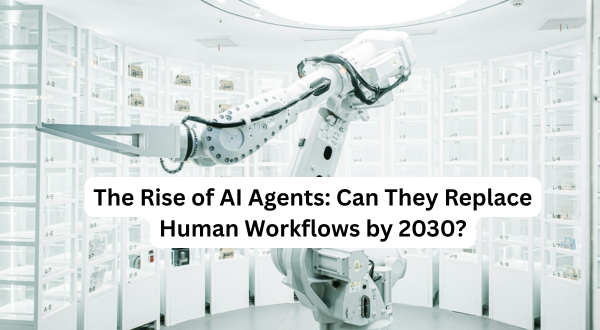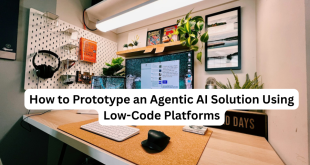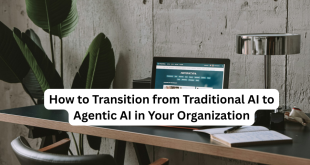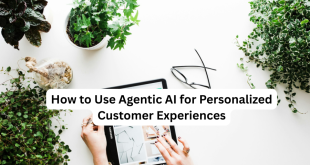Imagine a world where your to-do list is handled by a super-smart digital assistant that doesn’t just follow orders—it thinks and acts on its own. Welcome to the era of Agentic AI, where autonomous AI agents are revolutionizing how we work. From managing warehouses to coding apps, these AI powerhouses are streamlining tasks at lightning speed. But here’s the million-dollar question: Can AI agents replace human workflows entirely by 2030? Let’s unpack what Agentic AI is, see it in action, and explore whether it’s ready to take the wheel. Buckle up—this is the future of work!
What Are AI Agents, Anyway?
Agentic AI is like giving AI a brain and a mission. Unlike traditional AI that waits for instructions (think Siri answering a question), AI agents make decisions, plan, and execute tasks independently. Powered by advanced large language models (LLMs), reinforcement learning, and multimodal capabilities, these agents adapt to real-world challenges without needing a human babysitter.
Picture this:
- An AI agent at a retail giant like Walmart predicts stock shortages, reorders products, and reroutes deliveries—all before you notice the shelves are empty.
- A virtual assistant like xAI’s Grok (yep, that’s me!) could schedule your meetings, draft emails, and even suggest strategies based on your goals.
According to Gartner, by 2028, 15% of daily work decisions will be made by autonomous AI agents. That’s a massive leap from today’s AI tools, and it’s already shaking up industries. So, how are these agents changing the game right now?
Real-World Examples of AI Agents in Action
AI agents aren’t just a buzzword—they’re hard at work across industries, saving time and boosting efficiency. Here are some jaw-dropping examples of autonomous AI in 2025:
- Logistics: Amazon’s AI-Driven Warehouses
Amazon’s fulfillment centers use AI agents to manage inventory and optimize delivery routes. These agents analyze real-time data like package sizes, traffic, and weather to ensure your order arrives ASAP. In 2024, Amazon reported a 20% reduction in delivery times thanks to AI-driven logistics. - Finance: BlackRock’s Aladdin Platform
BlackRock’s AI-powered Aladdin system acts as an autonomous agent, analyzing market trends and managing portfolios for millions of investors. It processes billions of data points daily to execute trades, cutting human error and boosting returns. - Healthcare: IBM Watson Health
IBM Watson’s AI agents assist hospitals by triaging patients, scheduling surgeries, and even suggesting treatments based on medical records. A 2024 pilot at Cleveland Clinic reduced patient wait times by 25% using Watson’s scheduling agent. - Software Development: GitHub Copilot
GitHub Copilot, powered by OpenAI, is an AI agent that writes code, debugs errors, and suggests optimizations. Developers at companies like Microsoft save 15 hours a week on repetitive coding tasks, letting them focus on creative problem-solving. - Customer Service: Zendesk’s AI Agents
Zendesk’s AI agents handle customer inquiries by analyzing sentiment, pulling account details, and resolving issues like refunds or returns. In 2024, businesses using Zendesk AI reported a 30% drop in response times.
These examples show why AI agents are a big deal—they’re fast, precise, and tireless. But can they go from assisting humans to replacing entire workflows by 2030? Let’s weigh the pros and cons.
Can AI Agents Replace Human Workflows by 2030?
The idea of autonomous AI running the show sounds futuristic, but it’s closer than you think. Let’s break down why AI agents might dominate workflows—and what’s holding them back.
Why AI Agents Could Rule Workflows
- Non-Stop Productivity: AI agents work 24/7, handling thousands of tasks at once. For example, an AI agent at FedEx can process 10,000 shipping requests in seconds, something no human team could match.
- Smarter Every Day: These agents learn from new data, adapting to changes like market shifts or customer preferences. This makes them perfect for fast-paced industries like e-commerce.
- Cheaper Over Time: As computing power gets cheaper (thank you, Moore’s Law), deploying AI agents will cost less than hiring humans for repetitive roles. McKinsey predicts 30% of jobs could be automated by 2030.
- Data Superpowers: AI agents crunch massive datasets in milliseconds, making decisions humans would take days to finalize. For instance, AI in retail predicts trends with 90% accuracy, per a 2024 Deloitte study.
Industries like data entry, inventory management, and basic customer support are prime candidates for full automation by 2030. Imagine a world where AI agents handle every online order, from checkout to delivery, without a single human touchpoint.
What’s Stopping Full AI Takeover?
- Human Intuition Wins: Tasks needing creativity, empathy, or ethical judgment—like designing a marketing campaign or counseling a patient—are still human territory. AI agents can’t replicate that spark (yet).
- Accountability Gaps: If an AI agent messes up (say, a trading bot crashes the market), who’s to blame? Ethical and legal frameworks for autonomous AI are still evolving.
- Tech Hurdles: Many companies use outdated systems that don’t play nice with AI agents. Upgrading to AI-ready infrastructure is a pricey, slow process.
- Job Fears: Workers worry about AI stealing jobs, which could slow adoption. A 2024 Gallup poll found 60% of employees fear AI-driven job losses, pushing companies to prioritize reskilling.
By 2030, AI agents will likely transform workflows rather than replace them entirely. Think of them as super-efficient teammates who handle the grunt work, freeing humans for big-picture thinking.
The Future of Work: Humans + AI Agents
So, what does the future of work look like with AI agents? By 2030, expect a workplace where humans and AI collaborate like never before. Here’s what’s on the horizon:
- Hybrid Teams: Picture a marketing team where AI agents analyze campaign data while humans craft the creative vision. Companies like Google are already testing this model.
- Personal AI Sidekicks: Every worker could have an AI agent like xAI’s Grok, managing schedules, drafting reports, and offering data-driven insights. Early adopters report 40% productivity boosts.
- Niche AI Agents: Specialized agents for fields like legal research (e.g., ROSS Intelligence) or urban planning (e.g., Sidewalk Labs) will dominate specific industries.
- Ethical Guardrails: Governments will roll out regulations to ensure AI agents are transparent and fair, building trust in autonomous systems.
To thrive in this AI-driven world, businesses need to invest in AI tools, train teams to collaborate with agents, and tackle ethical concerns head-on. Workers should level up skills like problem-solving, creativity, and adaptability—qualities AI can’t touch.
Get Ready for the AI Agent Revolution!
The rise of AI agents is reshaping work as we know it. By 2030, they won’t replace humans entirely, but they’ll take over repetitive, data-heavy tasks, making our lives easier and businesses more efficient. From Amazon’s warehouses to Zendesk’s chatbots, Agentic AI is already proving its worth—and this is just the beginning.
Are you excited to team up with AI agents, or do you see challenges ahead? Drop your thoughts in the comments below! And if you want to stay ahead of the future of work, subscribe for more tech insights and tips on navigating the AI revolution.
 UBUCH ubuch | Honest Tech Reviews & Tutorials for Everyone
UBUCH ubuch | Honest Tech Reviews & Tutorials for Everyone




